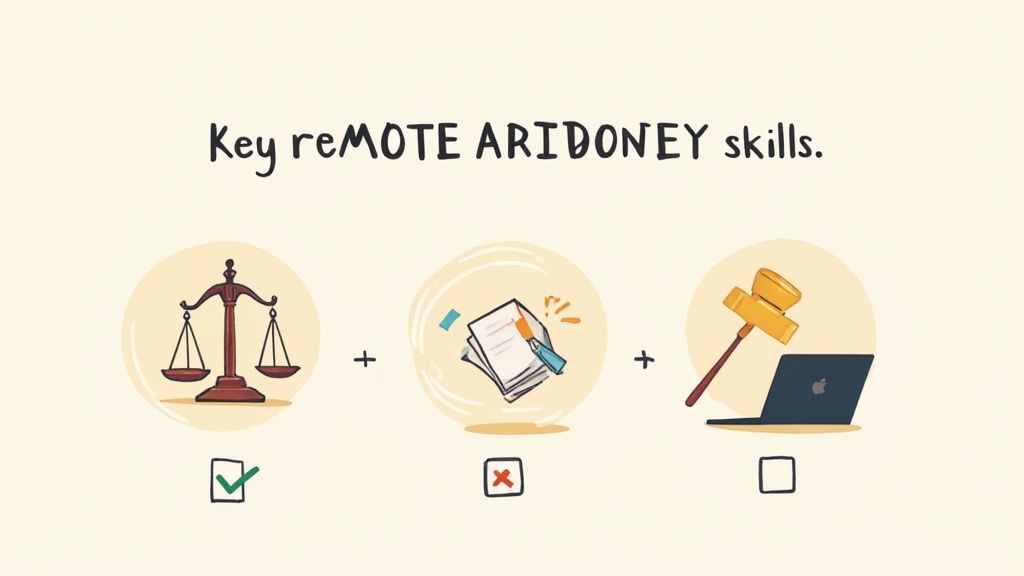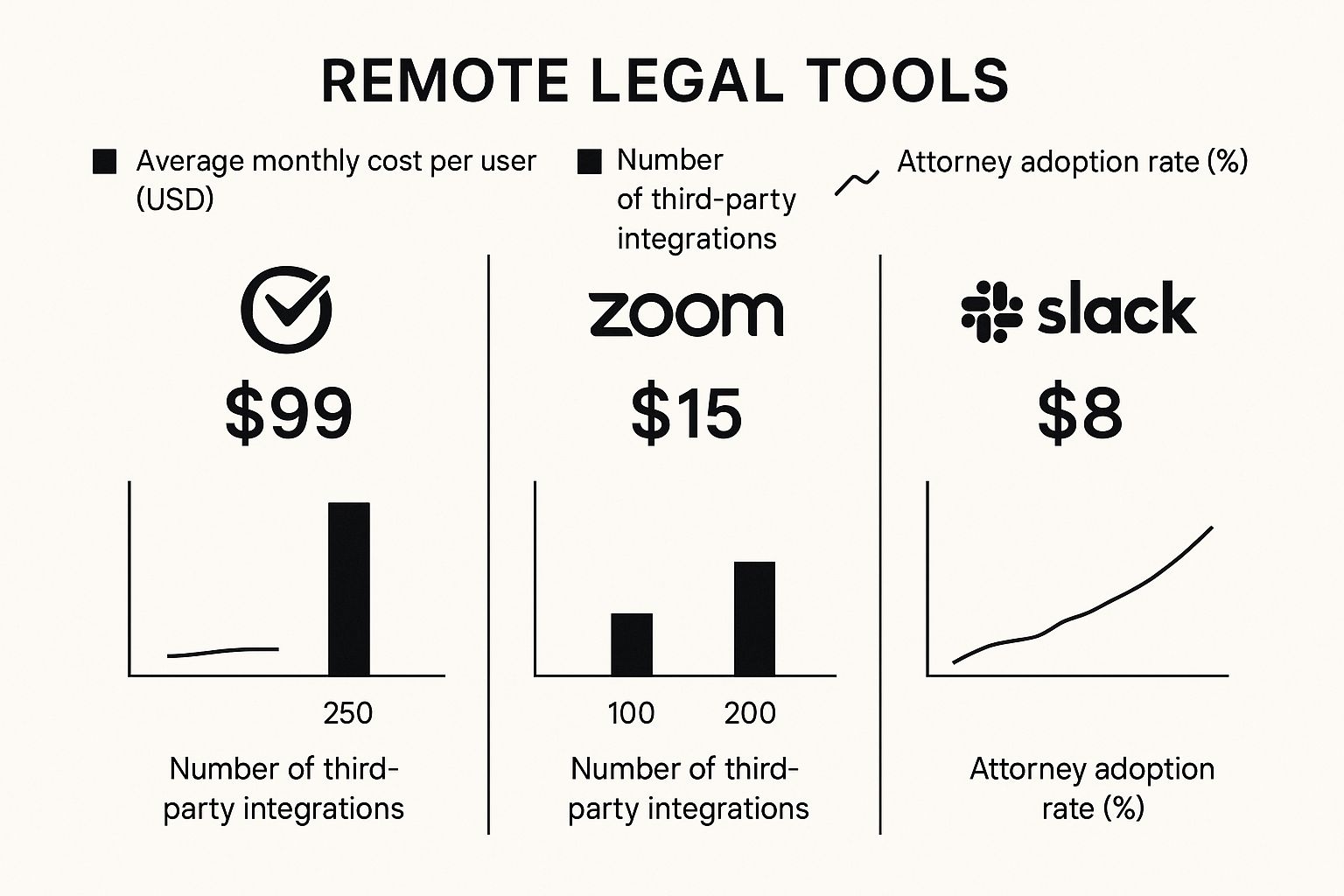
 24 minutes read
24 minutes read
Let's be real—finding a legitimate part time remote attorney job isn't about chasing a myth. It's about strategically trading an outdated career model for a much smarter one. This isn't some fantasy; it's a calculated move for lawyers in a legal market that's finally, finally catching up to the 21st century.
You can think of it as swapping your corner office for a home office, without seeing your career trajectory completely flatline. And trust me, I've seen enough bad models to know a good one when I see it.
If you're reading this, you're probably fed up. The traditional law firm model can be a special kind of soul-crushing, and the whole "partnership track" might sound less like a career goal and more like a life sentence. The endless pressure of billable hours, the mandatory face-time, the inescapable office politics—it’s a treadmill practically designed to burn out even the sharpest legal minds.

But what if there's another way? A path where you're still tackling high-level legal work, but entirely on your own terms. That's the promise of part-time remote legal roles, and it's more within reach now than ever before. The legal profession, notoriously resistant to change, is being dragged into the modern era whether it likes it or not.
For years, the idea of a "remote lawyer" was almost a punchline. Not anymore. The legal job market is incredibly tight, and firms are waking up to the fact that they can't afford to lose top-tier talent over something as arbitrary as a mandatory commute. They need your expertise, and they're increasingly willing to offer flexibility to get it.
This shift is backed by hard numbers. A recent Robert Half report on legal market trends gives us a clear picture of what's happening.
Here’s a quick breakdown of where the legal job market stands with remote work. No fluff, just the facts.
| Work Arrangement | Percentage of New Legal Postings | What This Means for You |
|---|---|---|
| Hybrid | 31% | The most common flexible option. You get the best of both worlds—some in-office collaboration and plenty of remote focus time. |
| Fully Remote | 7% | While a smaller slice, this is growing. These roles offer maximum autonomy and are often focused on specific, project-based work. |
| On-Site | 62% | Still the majority, but this number is shrinking. The competition for top talent is forcing even the most traditional firms to reconsider. |
With the unemployment rate for lawyers hovering at an almost unbelievable 0.9%, skilled legal professionals are a scarce resource. This scarcity is your leverage. It's forcing employers to get competitive with their offers, and flexibility is a key part of that package.
This isn't just a trend for small startups, either. Even buttoned-up, established firms and major corporate legal departments are getting on board. Why the sudden change of heart?

The most critical change isn't in the job market; it's in your mindset. You have to stop thinking like an employee waiting for permission and start acting like a high-value legal consultant who offers solutions.
This distinction is everything. An employee is often seen as someone who fills a seat from 9 to 5. A consultant, on the other hand, is hired to deliver a specific outcome, regardless of their location or the hours they log.
When you start applying for part time remote attorney jobs, you’re not just looking for a paycheck; you're selling a specialized service. Your pitch is no longer, "I'm a diligent worker." Instead, it becomes, "I can solve your complex M&A due diligence problem in 15 hours a week, and you don't even have to find me a desk."
This reframing is the key to landing the best gigs and is a core principle behind many successful https://hireparlegals.com/alternative-attorney-jobs/ that prioritize skill over seat time. You are the expert, and your time is the product. It’s time to start treating it that way.
If you enjoy scrolling through endless pages of "fully remote (but be in the office three days a week)" job posts, then by all means, stick to the big, generic boards. But the truth is, the best part time remote attorney jobs are rarely found hiding on Indeed or LinkedIn. Those platforms have become black holes for resumes, built for volume, not for the kind of surgical strike we're planning here.
Forget spamming your CV into the void. The goal isn't to apply for a hundred jobs; it's to find the five that actually matter. We’re talking about a targeted approach that gets you in front of decision-makers who already understand the value of flexible, high-end legal talent. It's time to go where the real opportunities are.
The first rule of finding a great flexible legal role? Stop looking where everyone else is. The most innovative firms and companies don't post these roles on mass-market sites because they'd get buried in a mountain of unqualified applicants. Instead, they turn to specialized platforms where they know they'll find attorneys who just get it.
Your new job search toolkit should include these kinds of resources:
These platforms cut through the noise. They're pre-vetted ecosystems where the employers are already sold on the concept of remote, part-time legal expertise. You're not trying to convince them of the model's value; you're just proving you're the right person for the job. You can find more targeted listings for remote work by exploring specialized resources, including our own breakdown of the best platforms for finding remote law jobs.
Now, let's talk about the jobs that aren't posted anywhere. Some of the most lucrative and flexible roles I've seen were created on the spot for the right person. This requires a shift from reactive applying to proactive networking—but not the greasy, business-card-swapping kind.
I’m talking about the "informational interview" that’s actually a stealth job pitch. Your targets are forward-thinking partners at mid-sized firms or GCs at growing tech companies. These are the people feeling the pain of being understaffed but not quite ready to commit to another full-time associate. You are their perfect solution.

Here's the play: You're not asking for a job. You're a consultant offering insights. You're reaching out to 'learn more about their practice' or 'discuss trends in their industry.' You're a peer, not a supplicant.
This strategy requires a bit of finesse, of course. You need to do your homework, really understand their business, and come to the conversation with a clear value proposition. What specific problem can you solve for them on a 15-20 hour-a-week basis?
Think about it from their perspective. A full-time hire is a massive commitment—salary, benefits, overhead, training. A part-time remote attorney, on the other hand, is a low-risk, high-reward variable expense. Turns out there’s more than one way to get top-tier legal talent without mortgaging the firm's ping-pong table.
This approach completely flips the script. Instead of waiting for a job description to appear, you're creating the demand. You're planting the seed that they don't just want a part-time remote lawyer; they need one. And lucky for them, you just happen to be available.
First things first: your old resume isn't going to work. Let's be honest, that beautifully formatted document highlighting your "in-office collaboration skills" is a relic of the past. It’s time for a complete overhaul. Stop thinking of your resume as a historical record and start seeing it for what it is: a sales pitch.
The product you're selling is a self-managing, tech-savvy, results-driven professional who doesn't need constant oversight—just a login. When it comes to part time remote attorney jobs, the hiring manager isn't just buying your legal acumen; they're buying your autonomy.

This isn’t just a niche preference anymore; it’s a massive shift in the legal industry. A 2023 American Bar Association survey found that a staggering 44% of young attorneys would leave their current job for one with greater remote flexibility. This is forcing firms to adapt, and your resume must speak their new language. To get a better sense of this trend, you can find more insights on the rise of remote legal jobs and what it means for your career.
Let's get straight to the point. Nobody hiring for a remote role cares that you "managed a caseload." That’s like a chef’s resume saying they "worked with food." It’s the absolute bare minimum and tells them nothing about your capabilities. A remote-ready resume translates every duty into a quantifiable achievement that proves you can deliver results without someone looking over your shoulder.
It’s all about showing, not telling. You need to reframe every single bullet point to scream, "I get things done, no matter where my desk is."
Before (The Office Drone):
After (The Remote Powerhouse):
See the difference? The "after" version is loaded with tangible proof. It names the specific tech, quantifies the impact, and highlights your ability to collaborate across departments without needing a conference room.
In a traditional office, your tech skills are often assumed to be "good enough." For a remote job, your tech proficiency is a core competency. If a hiring manager has to wonder if you can handle a shared document or lead a client call on Zoom, you've already lost.
Your resume needs a dedicated section that lists the specific tools you’ve mastered. Don't just say "proficient in legal software." That’s vague and unhelpful. You have to get specific.

Your tech stack isn’t just a list of software; it’s proof that you can integrate seamlessly into a modern, distributed team. It tells a potential employer that you won't need hand-holding on day one.
Your Tech Toolbox Should Include:
Listing these tools upfront signals that you’re not a tech tourist; you’re a native. It answers the unasked question in the back of every remote hiring manager's mind: "Will this person be a technical liability?" The answer is a resounding "no."
Finally, you need to strategically sprinkle keywords throughout your resume that align with the core principles of remote work. Hiring managers—and their AI-powered screening tools—are actively scanning for these signals. It's about building a narrative that you were built for this kind of work, even if your previous roles were in a traditional office.
Think about incorporating phrases that demonstrate key remote-friendly attributes:
By retrofitting your resume with these elements, you transform it from a passive summary of your past into a compelling pitch for your future as a high-performing remote attorney.
The virtual interview is a completely different beast than its in-person counterpart. It’s not just about what you say—it's your entire digital presentation. Let’s be blunt: bad lighting, a messy background, or crackly audio can torpedo your chances before you even get to discuss your qualifications.
Think of this as your pre-flight checklist. We’re not just talking about answering questions; we're talking about commanding the screen so they see you as the confident, capable attorney they’ve been searching for.
First things first, the basics. If your video freezes or your audio sounds like you're broadcasting from a tin can, you’ve already lost. You don't need a professional studio, but you do need to look like you've done this before. This isn't 2020 anymore; "sorry for my bad connection" is no longer an acceptable excuse.
Here’s the minimum viable setup:
Test everything beforehand. Seriously. Do a practice call with a friend. Is the camera at eye level? Is the audio clear? Is your cat planning a surprise cameo in the background? Get it all sorted out now, not two minutes before you log on.
Here it comes. The question that makes most candidates squirm: "How do you plan to stay integrated with the team while only working part-time?" Or the equally loaded, "How do you stay productive working from home?"
Your answer here is critical. A defensive or vague response confirms their worst fears—that you'll be disconnected, unavailable, and unproductive. You need to flip the script and present your part-time status as a feature, not a bug.

The secret is to frame your part-time availability as proof of your efficiency and focus. You're not offering them less time; you're offering them better time.
Instead of a weak, "Oh, I'm very disciplined," try something like this:
"That's a great question. In my experience, working on a focused, part-time schedule requires extreme efficiency. I structure my 20 hours a week around core deliverables, using tools like Asana to provide constant visibility into my progress. This model forces me to eliminate non-essential meetings and focus purely on high-impact work, which means you get a more concentrated, results-driven effort from me."
This response does a few things: It shows you’re proactive, you understand their underlying concerns, and you already have a system in place. You’re not just a part-time attorney; you're a lean, mean, legal-problem-solving machine.
Beyond the tech and the tough questions, virtual interviews for part time remote attorney jobs demand a higher level of engagement. You can't rely on the natural energy of an in-person meeting. You have to create it. For a deeper dive into common questions you might face, our guide on preparing for legal assistant interview questions has some great insights that apply here, too.
So, you got the offer. Congratulations! Take a moment to celebrate—you've earned it. But don't pop the champagne just yet. Getting the offer for a part-time remote attorney job is only half the battle. Now comes the real work: negotiating terms that won't have you secretly pulling full-time hours for part-time pay.
This is where a surprising number of lawyers, folks trained in the art of negotiation, completely drop the ball. We can advocate for multi-million dollar deals for our clients, but when our own contracts are on the table, we suddenly get timid. Don't be that lawyer. This negotiation is about more than just money; it's about architecting a role that delivers genuine, sustainable flexibility.
Let's get one thing straight right away: there's no such thing as "unlimited flexibility." That's often just corporate-speak for "we expect you to be available whenever we need you, including 10 PM on a Saturday."
True flexibility isn’t about ambiguity; it's defined by clear, mutually respected boundaries. It’s your job to draw those lines in the sand before you sign on the dotted line. If you don't define the terms, your employer certainly will, and it probably won't be in your favor. This is where you move past the salary talk and into the nitty-gritty of what your work life will actually look like.

Vague expectations are the enemy of a successful remote arrangement. Your goal is to eliminate any gray area around your hours, availability, and communication, ensuring your "flexible" job doesn't become a 24/7 on-call nightmare.
This playbook is all about making sure your new role respects your time and delivers the autonomy you've been fighting for.
This is the absolute cornerstone of your negotiation. Get this wrong, and nothing else really matters. You have to explicitly define what "part-time" means in a way that can be measured and enforced.
This isn't about being difficult. It's about being a professional who proactively manages expectations. A great employer will appreciate the clarity. A bad one will balk—and that’s a massive red flag you should be grateful to see before you've committed.
Once your time boundaries are locked in, you need to make sure you have the resources to do your job effectively and are being compensated fairly. Never assume the firm will provide everything you need.
For instance, the market for part-time remote attorney roles in states like California is incredibly active, with Indeed listing over 30 such positions as of early 2025. Employers in competitive markets aren't just offering flexible hours; they're packaging roles with benefits like 401(k)s, health insurance, and PTO for remote staff, with salaries often exceeding $75,000 for experienced counsel. You can find more details about these kinds of remote legal roles and their benefits in California.
This kind of market data is your leverage. Use it to push for a comprehensive package.
This table is a quick checklist to keep in your back pocket during the conversation. It ensures you cover all the crucial points beyond just the salary figure.
| Negotiation Point | Why It Matters | Your Goal |
|---|---|---|
| Weekly Hour Cap | Prevents "scope creep" and burnout. | A "not to exceed XX hours" clause in your contract. |
| Core Availability | Establishes boundaries for real-time work. | Clearly defined days/hours for meetings and calls. |
| Communication Protocol | Manages after-hours contact and urgency. | Agreed-upon response times and emergency channels. |
| Technology Stipend | Covers essential home office expenses. | A set monthly or annual amount for internet, phone, etc. |
| Software & Tools | Ensures you have what you need to be efficient. | Full access to all necessary legal tech and platforms. |
| Pro-Rated Benefits | Fairly compensates you beyond your salary. | Inclusion in health, retirement, and PTO plans. |
| Performance Metrics | Defines what success looks like in your role. | Clear, measurable goals tied to your part-time hours. |
Getting these details hammered out upfront prevents misunderstandings down the road and sets the foundation for a successful long-term relationship.

As the data shows, tools like Clio are popular but come with a cost. It’s vital to clarify who is footing the bill for these essential systems as part of your negotiation.
Ultimately, a successful negotiation isn't about winning every single point. It’s about building a sustainable, mutually beneficial partnership where both you and your employer know exactly what to expect. Get it all in writing, be confident in the value you bring, and you'll secure a role that's not just remote, but truly liberating.

Alright, you’ve made it this far, which means you’re serious about this. But I get it—there are still some nagging questions rattling around. Let’s tackle the big ones head-on, no sugarcoating.
This is a common misconception, and it’s completely backward. While a few entry-level document review gigs exist, the vast majority of legitimate part time remote attorney jobs are for experienced counsel. Think about it from the firm’s perspective.
They're not looking for a project they have to manage; they want a plug-and-play legal expert. They need someone with at least 5-7 years under their belt who can operate autonomously from day one. They’re paying for your efficiency and battle-tested expertise, not to teach you the ropes.
The sweet spot is for seasoned attorneys who can step in as fractional GCs, manage a complex litigation file, or handle a steady stream of contract negotiations without needing their hand held.
No surprise here: transactional work is still king. It's naturally suited for a remote setup, since it doesn't depend on court appearances or constant in-person meetings.
The biggest players are:
However, don't sleep on litigation. We're seeing a huge uptick in remote roles for motion drafting, discovery management, and legal research. Niche specialties like tech transactions, environmental law, and healthcare compliance are also booming because specialized knowledge trumps physical location every single time.
This is the big, scary, and entirely manageable hurdle. The answer isn't simple, because it depends entirely on the job and the employer.

Don't let multijurisdictional practice rules intimidate you out of applying. Modern companies and law firms are getting much savvier at navigating this, but the onus is on you to be transparent and proactive.
Many remote in-house counsel roles fall under exceptions that let you work for a single company even if you’re not barred in the state where you live (as long as you’re barred somewhere in the U.S.). For law firm roles, it's a bit trickier. They'll likely need you to be barred where the firm or its major clients are based.
The rise of the Uniform Bar Exam (UBE) has made portability much easier. Your strategy should be simple: be upfront about where you're licensed and target roles in those states or with national companies that have already figured this out. And for the love of all that is holy, double-check the specific state bar rules on Unauthorized Practice of Law (UPL).
Let’s kill this outdated idea right now. Ten years ago? Maybe. Today, building a career as a flexible legal expert is a respected and incredibly viable path.
You're not stepping off the "partnership track"—you're building a diverse portfolio of high-level experience across different industries. This makes you more adaptable and valuable, not less. It proves you have the self-discipline and project management chops that traditional roles often fail to develop.
The key is to be strategic. Choose roles that build your skills, not ones that treat you like a cog in a document review machine. A successful career in part time remote attorney jobs signals to any future employer that you are a results-oriented professional who can deliver without the fluff of office life. And frankly, what modern company isn't looking for that?